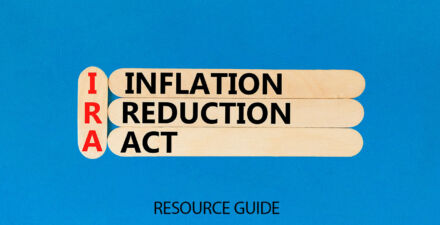Overview
The Washington Center for Equitable Growth seeks to deepen our understanding of how inequality affects economic growth and stability. Through our grantmaking, we aim to support research that will generate actionable insights for policymakers.
We are currently requesting proposals for research that will equip scholars and policymakers with evidence-based insights on how the Inflation Reduction Act’s policy design, coordination, and implementation affects equitable economic outcomes related to the economics of the clean energy transition. We recognize that other legislation, such as the Bipartisan Infrastructure Law, also made significant investments in the clean energy transition. Research exploring the interaction between the Inflation Reduction Act, or IRA, and other major federal investments is of interest. However, projects focused solely on non-IRA investments are outside the scope of this request.
Equitable Growth supports inquiry based on different kinds of evidence, methodological approaches, and insights from different academic disciplines. We are interested in descriptive studies that inform where and what types of investments are being made, structural modeling to better measure outcomes, and quasi-experimental methods or other rigorous statistical approaches to evaluate the effectiveness of specific policy levers. We also encourage the use of natural experiments to understand the distributional effects of potential and real changes to the legislation, implementation strategies, and final rules. Each type of research is crucial in providing a comprehensive understanding of the Inflation Reduction Act’s impact and improving the effectiveness of clean energy economic policy.
Research evaluating the tools used to spur job creation and job quality, revitalize domestic manufacturing, encourage investment in domestic clean energy industries, and spur economic innovation across multiple sectors is of interest. Projects that study and compare specific provisions, economic spillovers, monetization mechanisms, and thresholds within the law and their interactions with other federal programs will be especially relevant to policymakers. For all design elements, we are interested in how they influence the distribution of outcomes. Where appropriate, we are also interested in research that exploits them in empirical strategies.
We are especially interested in how new or underutilized economics, energy, or environmental data can be leveraged and/or linked together to evaluate the law’s distributional, labor market, fiscal, and macroeconomic effects.
Areas of interest include but are not limited to:
Labor market and regional effects
- What are the effects of IRA investments on the quantity and characteristics of jobs created or displaced? What are the effects on local and regional labor markets, and are there notable differences across places? Are there regional characteristics associated with different outcomes?
- What role are the Inflation Reduction Act’s labor and community protections playing in efficient and effective project delivery and outcomes for workers, communities, and firms?
- How are states and municipalities leveraging IRA investments, braiding or stacking them with other major federal investments, or utilizing them to access other U.S. financial tools and practices? What are the spillover effects in states or regions from major investment funding, beyond job creation from individual projects?
Innovation and investment
- Innovation plays a critical role in both promoting economic growth and in accelerating decarbonization. What are the impacts of the Inflation Reduction Act on innovation, and what are the distributional implications of clean energy innovation?
- What have been the effects of IRA investments on investment in domestic clean energy industries? Where has that investment happened? How has it connected to local economic development across places?
- How much are IRA investments spurring supply-side activity or demand-side behavior in communities affected by previous manufacturing declines or energy shocks?
Design and modeling of economic and climate policy
- What specific policy tools help maximize efficiencies and improve outcomes at the intersection of decarbonization and equitable economic growth? We are interested in research that analyzes the effectiveness of individual policy tools—such as tax credits, competitive grant programs, or loans—as well as research that compares the performance of different policies and/or assesses how these policies work in tandem.
- Where are there opportunities to integrate climate and economic research frameworks to better evaluate the Inflation Reduction Act in the short run and inform policy design in the future? How can the inputs and outputs of economic and climate models be better harmonized?
For all research questions, we will prioritize those looking at heterogenous effects. Projects that can shed light on which U.S. workers and communities are affected, as well as differences by race, gender, income, skill level, region, industry, or occupation, are of particular interest.
Those receiving funding through this Request for Proposals will be given the opportunity to receive training and support to participate in policymaker meetings, talk to members of the press, and otherwise translate their research findings for nonacademic audiences. See Equitable Growth’s grantee resources for examples of the support we provide and how we elevate research findings for nonacademic audiences.
Equitable Growth supports efforts to increase diversity in the social sciences. We recognize the importance of diverse perspectives in broadening and deepening the research on these questions.
Advisory Committee
Joseph Aldy, Professor of the Practice of Public Policy, Harvard Kennedy School
Heather Boushey, Senior Research Fellow, Harvard University; Steering Committee member, Washington Center for Equitable Growth
Susan Helper, Frank Tracy Carlton Professor of Economics, Weatherhead School of Management at Case Western Reserve University
Betony Jones, Founder & CEO, Inclusive Economics
Trevon Logan, ENGIE-Axium Endowed Professor of Economics, Ohio State University; Steering Committee member, Washington Center for Equitable Growth
Rajesh Nayak, Fellow, Center for Labor and a Just Economy at Harvard Law School; Fellow, Washington Center for Equitable Growth
Casey Schoeneberger, Consultant, Washington Center for Equitable Growth
Catherine Wolfram, William F. Pounds Professor of Energy Economics, Massachusetts Institute of Technology; Steering Committee member, Washington Center for Equitable Growth
Eligibility
This Request for Proposals is open to researchers affiliated with a U.S. college or university and graduate students currently enrolled in a Ph.D. program at a U.S. college or university in the dissertation stage of their career. The affiliated university must administer the grant.
Researchers not affiliated with a college or university, or with non-U.S. colleges and universities, can be part of a research team and can receive support via a grant. However, the Principal Investigator must be affiliated with a U.S. college or university, which must administer the grant.
Researchers who are the Principal Investigator for an open Equitable Growth grant with an end date beyond July 1, 2025 are not eligible to apply. Co-Principal Investigators/Collaborators with open grants are eligible to apply.
Deadline
The deadline to apply is 11:59 p.m. EDT on Thursday, May 22, 2025.
Funding decisions will be announced in July 2025 to allow funding to be dispersed at the start of the 2025–26 academic year.
Budget guidelines
Grants awarded in response to this request are expected to fall in the $25,000 to $80,000 range. Slightly larger grants may be considered if the budget is well-justified. Grant timelines should be limited to 2 years. Modest exceptions may be considered if an extended timeline is well-justified.
Equitable Growth is willing to fund a wide range of activities, including researcher salary and benefits, research assistance, data purchase, and costs associated with conducting experiments or research-related travel. Our grants cannot cover indirect overhead.
Summer salary is capped at $20,000 per year per Principal Investigator, not including fringe.
Fringe/benefit costs are allowable up to a maximum rate of 35 percent.
Tuition and related fees are an allowable cost if student research assistants are included in the budget request.
How to apply
To apply for a grant, use the online application portal to submit a six-page proposal, a two-page abbreviated curriculum vitae, and a draft budget using Equitable Growth’s budget template. Applicants are encouraged to use this template for the six-page proposal.
Proposals must include:
- The research question or problem the study seeks to address and how it relates to the questions posed in the Request for Proposals
- Engagement with and expected contribution to the literature
- Methodological approach, including data sources and research design
- Status of data access (note that we are unlikely to fund a project if the process for securing data is not underway)
- Timeline for completion
If tables, graphs, or other images are helpful in explaining your project, they can be included. While they will not count against the page limit, we encourage you to limit the use of images to one or two.
Citations can be included as endnotes and do not count against the page limit. We frequently partner with other foundations to support projects jointly or to share proposals that are not a fit for our grant program but which may be of interest to other funders.
Evaluation criteria
Grants made in response to this request must be approved by the Advisory Committee. Proposals will be evaluated by Equitable Growth staff and external reviewers. External reviewers consist of subject-matter and methodological experts and are selected with a commitment to diversity of race, gender, discipline, area of study, and university affiliation.
All applications will be evaluated on the following criteria:
- Responsiveness to the questions posed in this RFP
- Anticipated ability of the proposed research to provide policymakers with actionable insights to inform effective policy design and implementation
- Methodological soundness of the research design, including appropriate data
- Research questions that are appropriately framed within the existing literature
- Potential for proposed research to advance the literature
Feedback prior to submission
Equitable Growth cannot provide feedback on a written proposal prior to the application deadline, but staff are available to respond to questions. Email grants@equitablegrowth.org with questions.
You can also complete this form if you would like to schedule a time with a staff member to discuss your project or application. You will receive an email from grants@equitablegrowth.org to schedule a brief Zoom call.
Submit your application
Submit your application by creating an account and completing the submission form using our online application portal.
If you have questions or are having trouble with the application portal, please email grants@equitablegrowth.org or call 202-276-3368.
Related
Explore the Equitable Growth network of experts around the country and get answers to today's most pressing questions!



